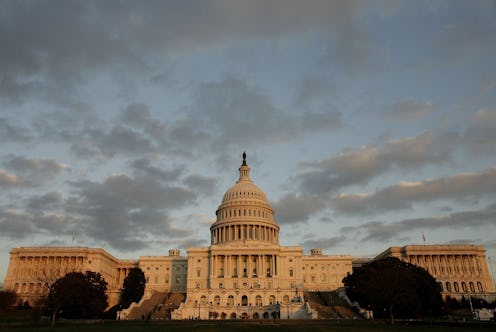News
How 2014 Could Shape 2016
Nothing is setting the stage for the 2016 presidential race quite like the 2014 midterm elections. Popular presidential prospects like Hillary Clinton, Governor Chris Christie, and Senator Rand Paul have been hitting the campaign trail in support of candidates in the Nov. 4 races, but every public appearance and speech is helping pave the way for their own possible campaign. Another major factor in the midterm elections, and in shaping 2016, is Obama, whose performance as president will inevitably inform Tuesday's voting, and which party ends up with control in Congress. Here are all the ways the midterm elections could influence the presidential race in 2016.
On Nov. 4, voters will take to the booths to select their representatives in the House, members of Senate, and in just over half of the states, their governors. Currently, the GOP has control of the House with 233 seats and the Democrats have control of the Senate with 53 seats, but that's all likely to change come Tuesday. The biggest change we could see is if Republicans take over the Senate, which would likely have a palpable impact on the rest of President Obama's term — and not a good one. And Obama himself may be the deciding factor in Senate control.
How Obama Will Influence the Midterm Elections
So how does Obama affect the race for the House and Senate? According to NPR, this midterm election will almost certainly succumb to the six-year itch. The "six-year itch" refers to the pattern that the election in the sixth year of a president's two terms tends to be bad news for the party in power. And if approval ratings were any indication (currently at a record low of 44 percent), then it's clear that the GOP has a solid chance of winning both houses in Congress.
In fact, Republicans have kept Obama's unpopularity as the central theme in the party's collective campaign. Princeton University political historian Julian Zelizer told The Hill:
All the other issues tie into that theme. That's why midterms often go poorly — opposition parties have the advantage that they can pile on an unpopular president.
What This Means For the Future
If Republicans take control of Congress, a number of things will likely happen — from more political gridlock in Obama's last two years to the appointment of Supreme Court justices who will base their rulings on more politically conservative beliefs. All of these factors will also shape the landscape for 2016. If the last two years of the current presidency is marked by a bolstered GOP, sparked by the momentum of a big win in the Senate, the 2016 presidential race will likely seem more enticing for Republican hopefuls and much less so for their Democratic counterparts. More GOP aspirants could come out of the woodwork and the so-called front-runners could run feel inspired — and fortified— to run on even more dynamic, perhaps extreme, platforms. The opposite effect may take hold of the Democratic side.
Kyle Kondik, managing editor of Larry Sabato's Crystal Ball, added that Obama's current state could further discourage Dems, telling the BBC:
And if Obama's approval numbers look like they do today or worst it will feel like a drag on Democratic candidates.
Which Supporters Will Be Bigger Players in 2016
And speaking of candidates, this year's midterm elections have clearly been a preview of presidential campaigns for certain players, and early reactions and theories are already starting to form. A clear front-runner for Democratic nominee, Hillary Clinton has been stumping for Gov. Maggie Hassan and Sen. Jeanne Shaheen. During one appearance, Shaheen made a loaded reference to 2016, asking the crowd, "Are you ready for Hillary?"
And as much as the current campaign trail endorses potential 2016 nominees, it can also be used against one's opponents. Sen. Rand Paul, who is also expected to declare his run for presidency, did just that when he campaigned for Kansas Sen. Pat Roberts and Gov. Sam Brownback and decided to use the podium to criticize Clinton (more than once):
Hillary Clinton comes up and she says, ‘Businesses don’t create jobs.’ Anybody here think businesses don’t create jobs? I’m here today to endorse Pat Roberts and Sam Brownback, because you know what? They know that businesses do create jobs, and I hope you know that too.
Looks like a clear picture of the 2016 presidential race is starting to form. Images: Getty Images (3)
